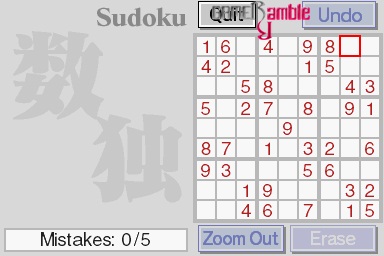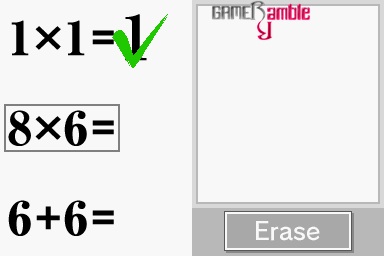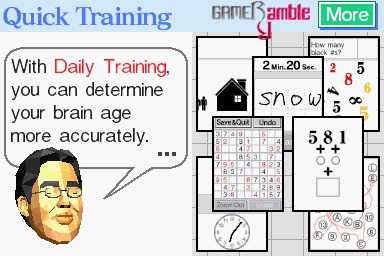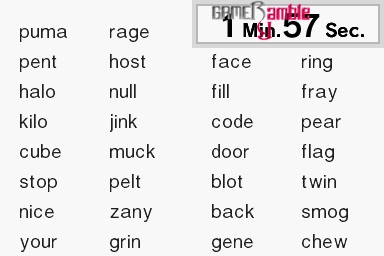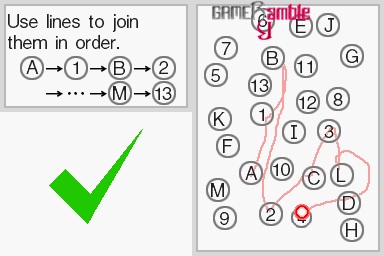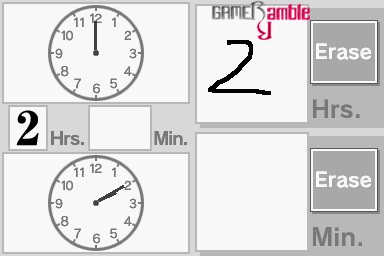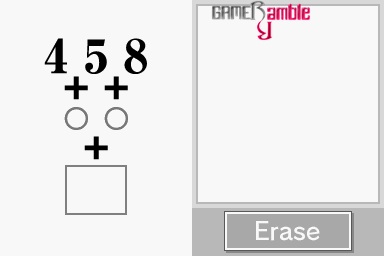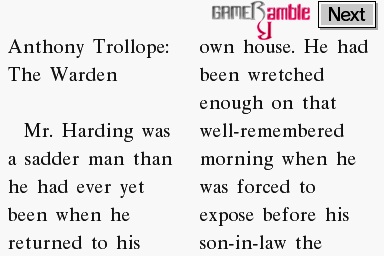Dr Kawashima’s Brain Training – How Old Is Your Brain
Developer: Nintendo SPD | Publisher: Nintendo | Release Date: 2006 | Genre: Puzzle | Website: N/A | Purchase: Amazon
| Size: 128 Mbit
Besides being a mouthful to pronounce, Dr. Kawashima’s Brain Training: How old is your brain? Is also a piece of software that will give you daily brain training exercises. While “clinically proven” to stimulate blood flow to certain areas of the brain, Nintendo is quick to point out that “Brain Age” is a non-scientific term and only used to measure your “score” within the game. Everything is based on same scientific research performed by Dr. Ryuta Kawashima, who is a Japanese neurologist and author of some brain training books.
According to the Dr. the youngest and optimal brain age is 20 years old. This software uses a series of maths, reading and calculation based activities to measure your brain age and by diligently performing the daily exercises you will steadily decrease your brain age. While there are plenty of debates disputing the accuracy of this software I do know that I started at a brain age somewhere in the seventies and that it took me a week or two to get it down to twenty. Whether it helped me with short term memory loss or forgetfulness I don’t know, but it was surprisingly fun for an “educational” piece of software. In fact the hundreds of extra Sudoko puzzles included in the package were enough to persuade me.
Brain Training has a very ‘minimal’ look and feel, even for a DS game, but that’s what makes it appealing to such a wide demographic. The Dr. himself is on hand in the form of a large disembodied polygonal head, giving you advice and asking questions. The rest of the visuals consist only of the bare minimum amount of text and graphics. The DS is held sideways like a book and all interactions with the software are performed via the stylus or microphone. You’ll be required to draw pictures, shout out the names of colors and answers or quickly write down the solutions to problems. While this system works fine for the most part it can be frustrating when the game struggles to make sense of your input. It does not happen a lot, but it definitely makes some activities easier than other and can skew test results. Brain Training works best when you have someone else to compare with and the game allows you to store up to four user profiles.
Although you can play as much as you want, scores are only calculated and stored once a day. Daily players will earn ‘stamps’ on their calendar which will unlock new game modes and skill levels. There’s only one head to head multiplayer game, however, a series of 30 math problems, which is somewhat odd considering the amount of activities on offer. For the rest you will simply be comparing times and scores between different players on the same device.
The activities themselves are a bit of a mixed bag. You’ll be required to count the amount of syllables in a phrase, count the amount of people entering and exiting a building in order to determine how many are left inside, calculate the time difference between two analogue clocks and even read sections of classical literature as fast and clearly as you can . Then there’s a spot of “triangle maths,” same word memorization and the infamous ‘stroop test’ that requires you to say the color of a word, not the word itself ( blue written in a red font for example. ) The implementation is a bit uneven however. The reading and counting activities make no use of the microphone & simply relies on the players honesty while the Stroop Test can sometimes have trouble recognizing the word “blue”. The penalties for making mistakes are also pretty steep which is quite infuriating when it is the game that is at fault and not the player. The game will occasionally ask you a question when you log in, like what you had for breakfast or what you saw on the news only to ask you to repeat the answer a few days later and showing you what you replied previously. It makes no difference whether you are right or wrong it’s just a little wake-up call to show you how lazy your brain is. Slightly more entertaining is the pictures that the Dr. sometimes ask you to draw from memory. This is especially entertaining when other players have profiles on your DS as it will store and compare the results. Once again, it serves no real purpose or count for anything within the game. The downside is that it is random and can be a nuisance if all you want to do is play some Suduko.
Brain Training is amusing while it lasts but, unlikely to hold your attention once everything is unlocked and your optimal brain age is reached. It is suitable for all ages and I can definitely see people sticking with it, but after a month or so of playing I found myself skipping days. The Sudoku puzzles kept me coming back for more however, as the touch screen and stylus made it very intuitive to play. The game is definitely not going to suit everyone’s tastes. The visuals are really bare bones and about the only attempts at animation are doctors head and the short clips that show you how fast you’ve completed an activity. Everything from walking to rocket speed is represented, but it’s really not much to look at. Likewise the audio mostly consists of some computerized bleep and bloops.
The low price point, novelty factor and wealth of Sudoku puzzles make Brain Training a worthwhile purchase but don’t expect miracles from it. While you might find yourself getting quicker at challenges within the game, the real world usefulness is a bone of contention for many.
*Review originally published 2006.


